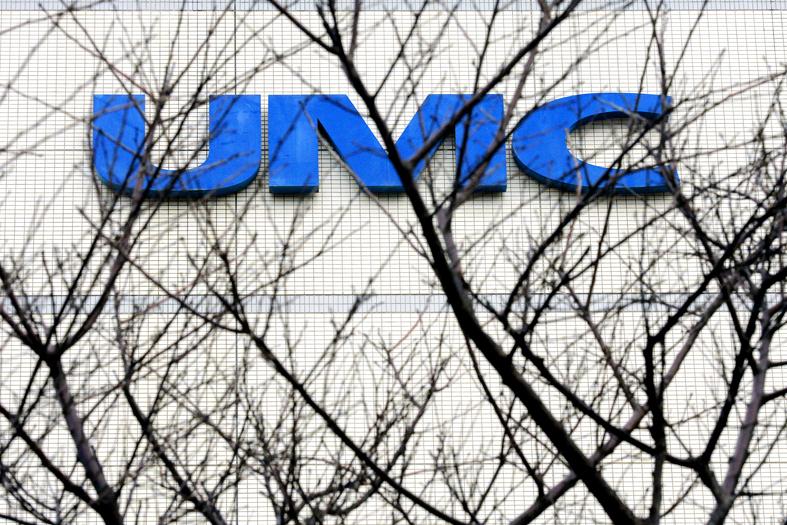United Microelectronics Corp (UMC, 聯電), the world’s third-largest contract chipmaker, yesterday said that it plans to invest NT$100 billion (US$3.58 billion) over three years to expand capacity at a local factory to resolve supply constraints.
The investment would be made together with customers, UMC said, without elaborating which other firms would be involved.
There is speculation that Samsung Electronics Co, Qualcomm Inc and MediaTek Inc (聯發科) might be the Hsinchu-based company’s partners amid a severe shortage of 28-nanometer chips.

Photo: Reuters
The firms would “make a deposit that secures their long-term chip supply,” UMC said in a statement, adding that fixed pricing would enable it “to grow organically and meet its long-term
profitability [goals].”
The planned expansion is expected to add about 27,500 12-inch wafers per month to the capacity at one of the company’s fabs in Tainan, UMC said.
The program is supported by a multiyear product alignment between UMC and the involved customers, UMC copresident S.C. Chien (簡山傑) said, adding that customers would place sufficient orders to ensure healthy capacity utilization rates.
The expanded fab would be outfitted with 28-nanometer equipment which could be updated to produce 14-nanometer nodes to meet emerging demand, Chien said.
UMC has raised its capital expenditure budget for this year by about 53 percent to US$2.3 billion, compared with US$1.5 billion planned previously.
Due to the supply-demand imbalance, the chipmaker expects its average selling price to rise 3 to 4 percent quarter-on-quarter, it said.
“Looking into the second quarter, market demand will continue to outpace supply,” UMC copresident Jason Wang (王石) said, adding that shipments would rise about 2 percent quarter-on-quarter this quarter.
Gross margin is to improve to 30 percent from 26.5 percent last quarter, driven by rising revenue contribution from 28-nanometer chips, he said, adding that about 20 percent of UMC’s revenue last quarter came from 28-nanometer chips.
UMC’s net profit surged 372.5 percent to NT$10.43 billion in the first quarter, compared with NT$2.21 billion in the same period last year, company data showed.
On a quarterly basis, net profit contracted 6.9 percent from NT$11.2 billion, it showed.
Earnings per share climbed to NT$0.85 from NT$0.19 a year earlier, but down from NT$0.92 in the previous quarter, the data showed.

Taiwan’s rapidly aging population is fueling a sharp increase in homes occupied solely by elderly people, a trend that is reshaping the nation’s housing market and social fabric, real-estate brokers said yesterday. About 850,000 residences were occupied by elderly people in the first quarter, including 655,000 that housed only one resident, the Ministry of the Interior said. The figures have nearly doubled from a decade earlier, Great Home Realty Co (大家房屋) said, as people aged 65 and older now make up 20.8 percent of the population. “The so-called silver tsunami represents more than just a demographic shift — it could fundamentally redefine the

The US government on Wednesday sanctioned more than two dozen companies in China, Turkey and the United Arab Emirates, including offshoots of a US chip firm, accusing the businesses of providing illicit support to Iran’s military or proxies. The US Department of Commerce included two subsidiaries of US-based chip distributor Arrow Electronics Inc (艾睿電子) on its so-called entity list published on the federal register for facilitating purchases by Iran’s proxies of US tech. Arrow spokesman John Hourigan said that the subsidiaries have been operating in full compliance with US export control regulations and his company is discussing with the US Bureau of

Businesses across the global semiconductor supply chain are bracing themselves for disruptions from an escalating trade war, after China imposed curbs on rare earth mineral exports and the US responded with additional tariffs and restrictions on software sales to the Asian nation. China’s restrictions, the most targeted move yet to limit supplies of rare earth materials, represent the first major attempt by Beijing to exercise long-arm jurisdiction over foreign companies to target the semiconductor industry, threatening to stall the chips powering the artificial intelligence (AI) boom. They prompted US President Donald Trump on Friday to announce that he would impose an additional

Pegatron Corp (和碩), a key assembler of Apple Inc’s iPhones, on Thursday reported a 12.3 percent year-on-year decline in revenue for last quarter to NT$257.86 billion (US$8.44 billion), but it expects revenue to improve in the second half on traditional holiday demand. The fourth quarter is usually the peak season for its communications products, a company official said on condition of anonymity. As Apple released its new iPhone 17 series early last month, sales in the communications segment rose sequentially last month, the official said. Shipments to Apple have been stable and in line with earlier expectations, they said. Pegatron shipped 2.4 million notebook